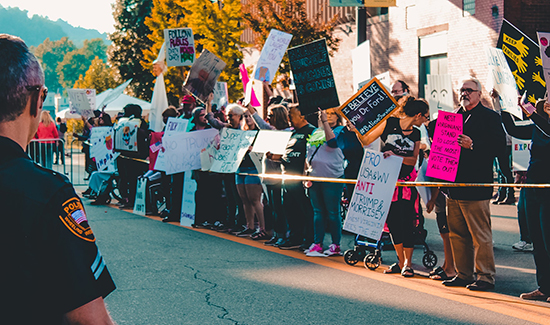How to Lead Your Church for Healing and Hope in a Nation Divided
Every week, pastors minister to congregations that may be split down the middle politically. How we respond and build our churches even during national disunity could determine if we only survive or if we actually thrive in this election year | by Doug Stringer
Years ago, I was asked by Dr. Bill Bright to be part of a videotaping with Max Lucado and Chuck Colson on the Soul of America. When asked my thoughts, I agreed there is a battle for the soul of America and of our generation. But the heart of any city, community, or nation should be the Church. If the heart is weak or sick, how can we bring healing to the soul of the city, community, or nation? I believed then, and now, that it’s crucial for the Church to return to its first love if we are to bring healing.
A House Divided
Because the Church often can’t agree on the best course of action to take, its influence isn’t as effective as it could or should be. Jesus said, “Every kingdom divided against itself is brought to desolation, and every city or house divided against itself will not stand” (Matthew 12:25, NKJV). The Church’s influence in America is waning in part because it is divided in heart and purpose.
Many of the problems plaguing the Church stem from putting personal agendas and preferences above God’s plans. Rather than building on the foundations of His Kingdom, we have placed our faith and hope in the institutions of men. Not surprisingly, the results are disastrous and far-reaching. History has already shown us the devastating effects that a divided house has on its nation.
After their deliverance from Egypt, God gave the Israelites the Promised Land. But the tribes of Reuben, Gad and the half-tribe of Manasseh asked to settle on the Trans-Jordan side of the river. Although they helped the other tribes settle the Promised Land as commanded by Moses and Joshua, they did not stay there. A split like this was no small thing in the eyes of the Israelites, and it had significant effects on the rest of the tribes. They were divided by a physical boundary ⎯ the Jordan River ⎯ so they naturally created separate cultural and religious identities. Some scholars believe this was the precursor to the divided kingdom. I wonder, if they had all settled together in the Promised Land and remained undivided, would Israel itself have remained undivided.
I also wonder this: If the Church were undivided in heart and voice, would we be the very conduit of moral strength, healing and hope in the nation? Yes, there is a battle for the soul of America, but when the Church, the heart of the nation is strong, all others, even those who oppose us, benefit from our strength. To keep such a divisive and irreparable split from happening in the Church, we must consent to move past our differences—be they denominational, racial, generational, or political—and become part of something bigger than ourselves under the Lordship of Jesus Christ.
His Presence Brings Unity
In Matthew chapter 28, we read that the disciples went to the mountain Jesus had appointed for them. When they saw Him, they worshiped Him. In His Presence there were no personal agendas or preferences; and His authority and commission were given to them. We also see in the Old Testament, the priests came out of the Most Holy Place sanctified and without division (2 Chronicles 5:11-14). They were as one, praising and thanking the Lord, and the glory of the Lord filled that place. If we are to see the foundations of our nation restored, we must be willing to cross our barriers and dividing walls to meet at the Cross of Christ.
Unity in Diversity
As an American of Asian descent, married to a Texas-born Latina of Mexican descent, I recognize that there may be unique perspectives, experiences, and challenges every one of us of various ethnic backgrounds have. Too often we create walls by the categories in which we place ourselves and others. God loves the beauty of all His creation, whether black, white, brown, red or yellow. Together we are His “Coat of Many Colors.” Unity is not uniformity. We can have unity in our diversity. Although I am blessed by my Japanese and Asian roots, I am not Japanese first, nor Japanese American, nor Asian American. Jesus taught that His brother, sister, and mother are those who hear the word of God and follow it. I am Christian first.
As Americans, there are real and genuine issues and concerns that we must be willing to honestly address. As Christians, we should do so in Christ’s example of love and civility.
Focusing on God’s Agenda
The Church, united in biblical foundation and ideology, should have the greatest voice in our nation. We should not be owned or influenced by any political party, but rather we should be the plumb line of truth in love, righteousness and justice, and healing and hope in the nation. If the Church would willingly release its worldly agenda and focus on God’s agenda, we could bring lasting change to every sphere of society.
We are at a critical juncture in our nation. In order for serious change to happen, we, the Church, must get back to our first love, and to the unshakable foundations of the Lord.
A Lasting, Inward Change
The nation and the Church need a revival of character. We need leaders who love the people they are called to serve more than they love being served.
We are in need of an awakening in the Church if we are to see a revival in our nation. We must be careful to guard against superficial change. Reform must be internal in order for it to bring lasting external transformation. For any change to be lasting and meaningful, it must come from an inward change. An external change made only for show will not help the Church or the nation, but an internal change that carries over to the Church’s external dealings will positively impact America for generations.
During the reign of Josiah, King of Judah, a reformation took place (around 622 B.C.). Josiah listened to the prophet of the Lord and led the nation in a return to following God’s commands and laws. The country was rid of pagan altars and spiritists. Yet Zephaniah reminds us that a revival that produces outward change without fully removing the heart’s inward corruption will not last. Though the people of Judah outwardly turned to God, their hearts were not changed. They quickly turned back to their pagan idols after King Josiah died.
How similar this situation is to the one in the Church and in our nation today!
In order to see lasting change in our nation, we must first be intimately aware of the state of the Church and its people. A.W. Tozer observed in The Gift of Prophetic Insight that “what God says to the Church at any given time period depends altogether upon her moral and spiritual condition, and upon the spiritual need of the hour.”
For national reform that will make a lasting impact spiritually and politically, we as Christians must return to our foundations, our first love, and become lovers of truth.






